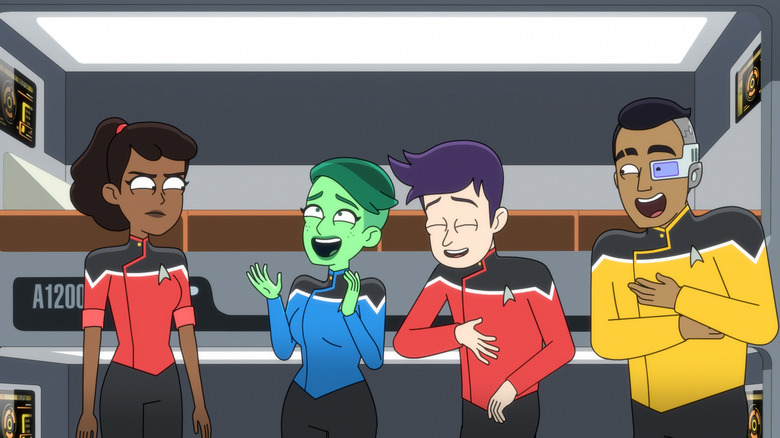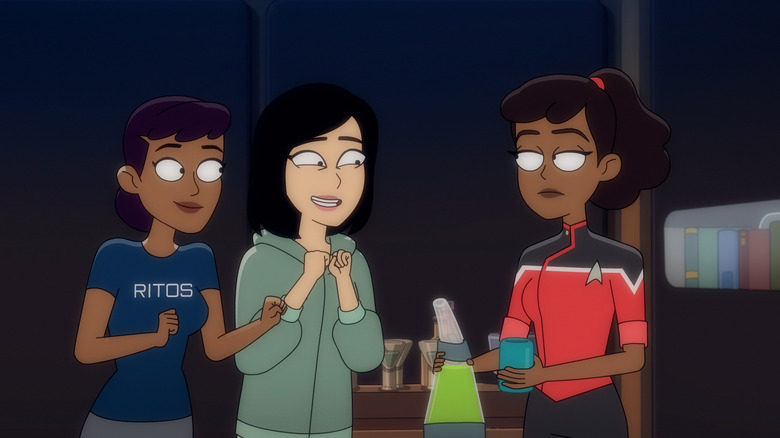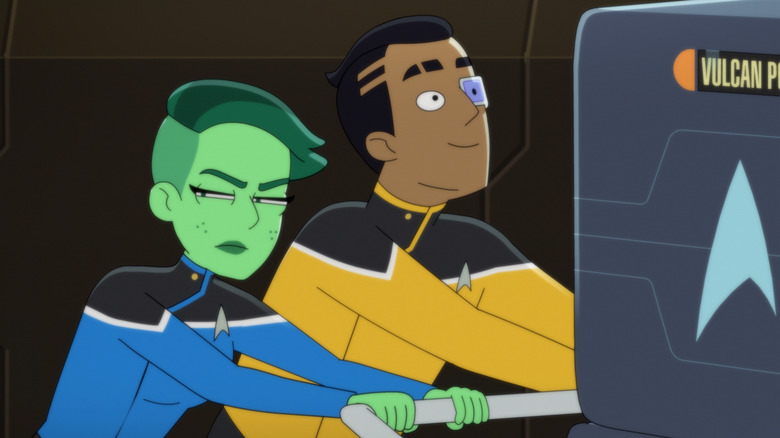Sci-Fi Isn't The Main Focus For The Writers Of Star Trek: Lower Decks
William Shatner's 2014 hour-long documentary "Chaos on the Bridge" details the early days of "Star Trek: The Next Generation" and specifically focuses on how, for the show's first two seasons, no one seemed to be in charge. Gene Roddenberry created the show, but one of his lawyers, a sinister figure named Leonard Maizlish, would swoop in, rewrite scripts, change personnel, and generally try to take control. Infamously, producer Maurice Hurley didn't get along with actress Gates McFadden, leading to her departure for the show's second season. No one, it seems, could decide what kind of show "Star Trek: The Next Generation" ought to be.
The general consensus among Trekkies is that "Next Gen" picked up in quality in its third season. This was likely the result of a change in staff, with producers Michael Piller and Ron D. Moore being added to the writers' room. It was also in the third season that "Next Gen" became more character-oriented, with individual episodes focusing on specific members of the ensemble. There would be, for instance, a Geordi (LeVar Burton) episode, followed by an ensemble episode, followed by a Picard (Patrick Stewart) episode, etc. Each one would add to the larger fabric of the show in small ways.
This model continued throughout "Trek" for years, forming the backbone of the franchise up until the cancelation of "Star Trek: Enterprise" in 2005. When "Trek" started up again in the Paramount+ era, the model was abandoned as episodic TV was no longer fashionable. It would be with the episodic entries "Lower Decks" and "Strange New Worlds" that the Moore/Piller era would be recreated. This is especially true of "Lower Decks," which follows in the same timeline as "Next Generation," "Deep Space Nine," and "Voyager."
Genre roulette
In a recent interview with Fangirlish, "Lower Decks" creator Mike McMahan talked about how the character-forward approach to "Star Trek" allows him to think outside of the genre of science fiction. Seeing as "Star Trek" is 56 years old, he seems to feel that the genre can finally be taken at face value; audiences now accept the spatial phenomena and starships that have become indispensable parts of the "Trek" empire. No one has to be walked through the technology, the aliens, or the specific functions of the U.S.S. Cerritos anymore. Trekkies understand all that, and McMahan can now get to his true interests: exploring other genres.
He explained that his exploration permitted, at least for him, an easier way to subtly construct character arcs. In his words:
"At the beginning, I came in with some stuff that I know I want to do. Some structural things, like I know I want this episode to feel like a sketch comedy episode. I knew I wanted to go to 'Deep Space Nine,' and then if you watch all three seasons, you'll notice I have a pattern for how I want the stakes to rise with enough room ... for specific character-exploration episodes."
There are four central characters on "Lower Decks," each of them an ensign assigned to a tiny, unglamorous Starfleet vessel. They love Starfleet, but their jobs are often really terrible. The central joke of the show is that lower-ranking officers don't get to directly participate in the command decisions on the bridge, and sometimes don't even know what's happening up there. In a recent episode, their sleeping quarters are magically turned into a stone temple. This happened without their knowledge and was solved without their aid.
The Clerks of Star Trek
This has allowed McMahan to free himself of "the main plot," as it were, and focus on his characters. Over the course of the series to date, Ensigns Mariner (Tawny Newsome), Boimler (Jack Quaid), Tendi (Noël Wells), and Rutherford (Eugene Cordero) have slowly grown and changed in subtle ways, growing up and discovering more about themselves. If the joke of the series persists, however, they'll have to consistently screw up — or merely be overlooked — long enough to remain ensigns.
McMahan, then, can look to the lower deckers as unfortunate working stiffs in their 20s who have crappy jobs. "Lower Decks" has just as much in common with "Clerks" as with Trek. That notion drives "Lower Decks" stories more than any sci-fi concept. In McMahan's words:
"[M]ost of the time it's saying, 'This week, let's tell stories about times when we were in our 20s and working in the service industry or customer assistance or whatever it was. Let's tell stories about being 'lower deckers' and how it can apply to our four leads.' Where are they this season? What can we explore with them? What can they learn about themselves? And THEN we layer in the sci-fi parts on top of that."
To date, this approach has made "Lower Decks" one of the stronger recent "Trek" shows. The sci-fi elements are there, but when a character is not a bridge officer, they won't be discovering them alongside the captain. They'll more likely be racing other ensigns to get proper quarters, or finding ways to more creatively slack off. At this point, and with a comedic show like "Lower Decks," we can all safely take "Trek" for granted.


